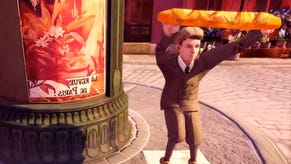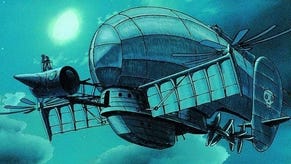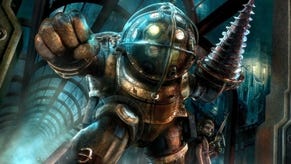BioShock Infinite review
Patriot games.
It would be hard not to begin with Elizabeth. Your computer-controlled female co-star is convincing enough that she becomes one of the most normal things in BioShock Infinite, a tightly wound first-person shooter where you summon fire and lightning from your fingertips as you fight your way through an impossible city suspended in the clouds. And like Andrew Ryan - the idealist who built Rapture, the city under the ocean that dominated the first BioShock - she is a constant presence.
Before you meet her, the game is all about her. She is the daughter of Zachary Comstock, a self-styled prophet who has transformed veneration of America's Founding Fathers into a supremacist cult, and who conceived the floating city of Columbia as a new Ark to carry his followers away from "the Sodom below" - the United States of America. As Booker DeWitt, a former soldier and strike-breaker with a troubled past, you have been sent to this new Eden to retrieve her and take her to New York.
Once you meet her, the game is all about her. She has been kept in a tower for almost her entire life, reading endless books and trying to understand a strange power she has to open 'tears' in the fabric of reality. When you set her free, everything is new to her, and because believable companions are still so rare in video games, you share her sense of wonder as she dances with strangers on a beach or brings fruit to a frightened child cowering under a stair. She never gets in your way, and while it becomes apparent from time to time that she is being subtly teleported around out of sight to fit the circumstances of your behaviour, you dismiss any sense of her artificiality as quickly as you would deja vu.
And if she ever disappears from view for more than a few moments, you miss her. You miss the way she tosses you items as you explore and fight - a quick swivel in her direction at the touch of a button to be met with the perfect arc and swoosh of her throw - and the conversations you have as she picks locks or rides an elevator with you. She never feels like a MacGuffin or a damsel in distress and you never feel like you're protecting her. You're not supposed to fall in love with her either. You just like her. The game creates a familial bond.
The fact that you come to take Elizabeth's unlikely existence for granted is one of the strangest and most brilliant things about BioShock Infinite.
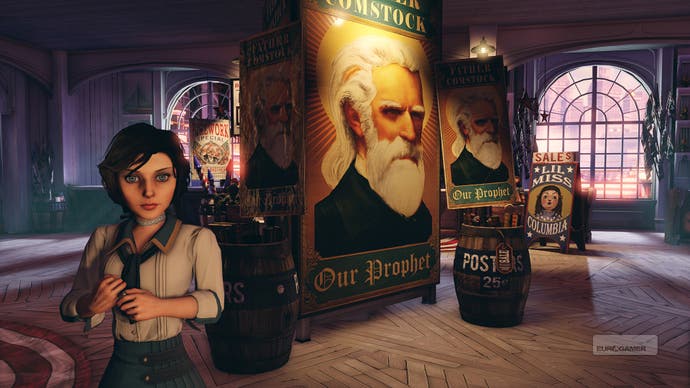
The city she lives in is less strange by video game standards, but no less brilliant. As impossible settings go, Columbia hangs together just as well as Rapture did, even as the gathering clouds in the second half of the game give it an ethereal edge - and I really lost myself in the first few hours, glorying in every structure, custom and morsel of dialogue. Mechanical horses clank along cobbled streets, a barbershop quartet sings a familiar song on a floating barge, beautiful propaganda posters hang on every wall. The artists' squared, blushed and brightened take on 1912 Americana is more Snow White in the sky than Rapture fished from the sea, and feels as bright and fresh as the last game was dark.
This is a game with a whole story, one that isn't going to peak with a party trick and then subside again, so it takes its time.
The basic pattern of clearing out areas and then picking through the leftovers to uncover money, upgrades and audio diaries has seen less attention, however. Fans of the loosely corralled cross-developer Shock dynasty may be surprised how much less ground there is to cover than there was at the bottom of the ocean, with only a few sections that bulge with detours and alternative routes. It's so pronounced, in fact, that there's no need for a map or dedicated save/load system, so F6 and F9 get the day off in favour of autosaves.
Not that Columbia lacks heft; it just feels more focused. This is a game with a whole story, one that isn't going to peak with a party trick and then subside again, so it takes its time. The 'voxophone' audio diaries - still crude, still effective - tease more of the details that frame what's happening to Booker and Elizabeth, explaining the source of Comstock's beliefs and how his actions give rise to his nemesis Daisy Fitzroy, leader of the Vox Populi worker faction whose dissent is simmering in the slums beneath the city's industrial district. You also get to understand why Comstock believes that Elizabeth will succeed him and destroy "the mountains of man" below Columbia - something that seems unimaginable when you meet her in person.
Booker and Elizabeth, meanwhile, start off in mutual confusion - he's been sent to get her but doesn't understand why, she's never set foot outside her tower - and as events divide and unite them, not least their pursuit by the terrifying mechanical 'songbird', they discover each other together in a way that never feels forced, no matter how unusual the circumstances. And things get pretty weird, so that's saying something. From the very first screen - a quote from one of the main characters - you get a sense of what the writers plan to do, but even the most creative player will struggle to imagine some of the twists and turns that follow, especially in the final, riveting hours of payoff.
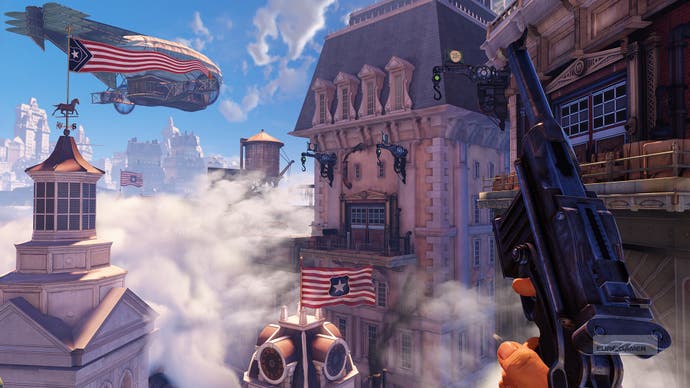
It's a journey that could have been fraught with writing mishap, but the game's authors co-opt difficult subject matter - like the Wounded Knee Massacre, where the 7th Cavalry killed 150 Lakota Sioux, and the pronounced racial divide in the century following the Civil War - with gentler, more assured hands than the ones that confronted you with the decision to adopt or harvest Little Sisters in Rapture. These details are here for a convincing reason and they give Columbia greater integrity.
Infinite also puts its supporting cast on-screen, rather than phoning in their instructions and revelations. While antagonists sometimes echo the tics of past series villains, the areas of the game where you encounter them, like Cornelius Slate's Hall of Heroes, are tremendously well assembled, integrating every character's back-story, current events, your own in-game actions and the game's larger ideas with breezy ingenuity that looks masterful when the ending puts everything into context.
You get into a lot of fights on the way to its startling revelations, of course, and here initially Infinite feels like a narrower take on the original BioShock, with refinements like two weapon slots into which you can channel tactical considerations. BioShock had plasmids; Infinite has vigors: magical attacks that work in a similar way, with a projectile version and a trap mode. Undertow, for example, fires a wave of water that knocks enemies backwards off their feet - handy when you're next to a precipice - while the alternate-fire attack pulls them in for a close-range kill. Vigors and weapons can be given functional upgrades in exchange for cash at vending machines.
The pace of combat is still frantic, thanks to fast-moving and often devastatingly accurate enemies. The basic types are unremarkable, but others have more character, like the Patriots, motorised Founding Fathers who trundle forward peppering you with rockets, losing their Jefferson and Washington visages after a headshot to reveal a glaring metal skull that keeps on coming. The gorilla-like Handyman, meanwhile, can close the gap to you in seconds from anywhere in the environment and flatten you in even less time.
That mobility is important, too, because whereas BioShock was a close-range shooter set in tight environments, Infinite's broader horizons make for roomier fights. It wasn't long before the sniper rifle became ever-present in one of my two weapon slots, but I still needed to have something useful at close quarters, because most of the well-designed battlegrounds are also home to skylines - overhead railways of metal that you leap and latch magnetically onto at the touch of a button, soaring through the environment to escape or run down foes who are also equipped with hook devices.
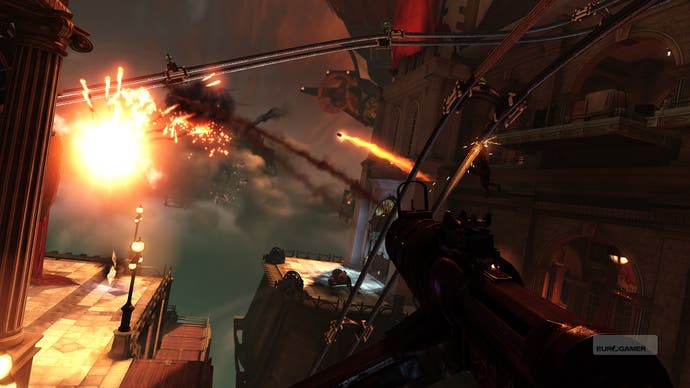
Enemies lack the kind of inspiring artificial intelligence that makes firefights in Halo so distinctive, but Infinite soon establishes its own feel and it works. Sprinting and flying around the environment, spitting vigors while cocking a shotgun and reloading as I ran enemies through minefields of tornado and fire traps - Elizabeth out of danger but never far from my side - battles became something I looked forward to as much as the next rummage through an abandoned side street full of secrets.
Both combat and exploration are the leanest in the series to date, then, but both develop the same hold over your attention, and once the game is over you'll struggle to care about them anyway. BioShock Infinite doesn't blur the lines between your reality and the game's to quite the same extent as its predecessor, but it's a more complete and polished story, and that's the thing you'll remember. At one point a central character remarks, "Perception without comprehension is a dangerous combination," and it sticks in your mind; this is a story of how the wrong idea can really go a long way.
You can still expect to be sat around tables with your friends arguing about it, too - how did that really happen, how does that work with that - and whether you saw particular moments coming. And as soon as you finish it the first thing you want to do is start again so you can test the game against its own internal logic. You'll find it holds together remarkably well; you'll be amazed that they pulled it off.
Most of all, though, you'll be amazed that Elizabeth works. To begin with, you imagine she will be someone who tags along behind you as you plunder Columbia for loot and scraps of bonus narrative, but her AI is such that you often find her running in front of you, anticipating where you want to go. It's a great trick, but it's also symbolic, because by the end of the game you realise that you are not the main character in any real sense. She is. She always has been. She always will be. It's her journey. You're just along for the ride. Still: what a ride.




